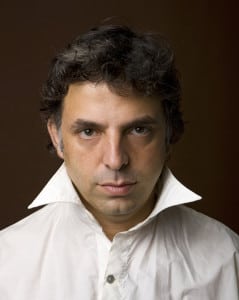 Renowned Israeli writer and filmmaker Etgar Keret, who last visited Louisville during the 2008 Festival of the Book, will speak at the University of Louisville on Friday, October 16, at 3 p.m. about his recent critical success, the memoir The Seven Good Years. The program will be in the Hassold Theatre, HM100 in the Humanities Building directly across from the Ekstrom Library.
Renowned Israeli writer and filmmaker Etgar Keret, who last visited Louisville during the 2008 Festival of the Book, will speak at the University of Louisville on Friday, October 16, at 3 p.m. about his recent critical success, the memoir The Seven Good Years. The program will be in the Hassold Theatre, HM100 in the Humanities Building directly across from the Ekstrom Library.
Keret will also be the guest speaker at The Temple during Shabbat services at 7 p.m. the same day.
The seven years of the memoir’s title traverse monumental upheavals in Keret’s life (his son’s birth on a day of terror, his much-beloved father’s death), but also frequently pause for ruminations on the pleasures of the everyday. And it is here that Keret’s unrivalled voice really shines, offering startling revelations, wry humor, and notes of grace. And for readers who are aware that both of Keret’s parents were Holocaust survivors, the connection between that shadow and Keret’s literary sensibility proves increasingly revelatory and consequential in these reminiscences.
Keret regales us with how his survivor father’s postwar escapades morphed into the unlikely subjects of the bedtime stories that beguiled Keret every night of his childhood, leaving an indelible impact on his adult literary sensibility.
Keret nimbly captures the euphoria of his father’s postwar liberation: “Compared with the horrors and cruelty he witnessed during the war, it’s easy to imagine how his new acquaintances from the underworld must have seemed to him: happy, even compassionate. He walks down the street, smiling faces wish him a good day in mellifluous Italian, and for the first time in his adult life, he doesn’t have to be afraid or hide the fact that he’s a Jew.”
Recalling those bedtime tales now, Keret has an epiphany: “beyond their fascinating plots, they were meant to teach me something. Something about the almost desperate human need to find good in the least likely places. Something about the desire not to beautify reality, but to persist in searching for an angle that would put ugliness in a better light and create affection and empathy for every wart and wrinkle on its scarred face.”
In spite of its brevity, Seven Good Years delivers some very big truths about family and society, not only about Israel, but also in its portrayal of incidents from Keret’s public life abroad – some heartwarming but others quite chilling, such as when he meets a Hungarian in a bar after a literary event in Budapest, who proudly exposes the huge German eagle tattooed on his chest: “His grandfather killed three hundred Jews in the Holocaust, and he himself hoped to boast someday about a similar number.” As recounted here, the resolutely secular and generally apolitical Keret has siblings who have taken very different paths in life – a brother who embraces anarchism and lives in Thailand and a sister who became ultra-Orthodox and has 11 children.
For many liberal Israelis who have experienced a loved one’s sudden choice to become a hozer betshuva (one who repentantly returns to the faith), this can feel like irreparable loss. Indeed, this phenomenon has become so widespread that a popular Israeli genre of mournful songs has emerged, though nobody captures the pain felt by those left in the wake of the conversions more precisely than Keret.
“Nineteen years ago, in a small wedding hall in Bnei Brak, my older sister died, and she now lives in the most Orthodox neighborhood in Jerusalem,” he wrote. Though she refuses to let her children read any of the popular children’s books Keret has written (not even the specially illustrated “kosher” version he demanded that his publisher create, in which all the characters appear in pious dress), Keret’s farsighted and reconciliatory nature prevails. He genuinely regards each of the siblings’ lives as embodying equally valid paths toward redemption, through the troika of their dissimilar passions: art, politics, faith.
There are abysses in every life and Keret’s memoir demonstrates his quiet courage and wisdom in coping with one particularly horrific week that included his wife’s hospitalization after complications that ensue from a miscarriage, the news that his father’s cancer has returned, and his own narrow escape from a terrifying car accident.
Seven Good Years sparkles with humor and poignant wisdom, rendering wonderful immersions into Keret’s inner landscape, the gentle and deeply affecting ways that both strangers and loved ones stir his compassionate imagination.
Check the next issue of Community for the exact location of the lecture.



